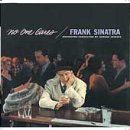|
The great Spanish guitarist, Carlos Montoya, can walk out on a bare stage,
sit down alone and without speaking a word or striking a note, dominate
the audience. David Oistrakh can do this. So can John Gielgud and Carl
Sandburg.
It is the mark of that degree of personal magnetism discernible only
in artists who have risen so far above the ordinary that they are able
to do automatically what many good artists can do only occasionally.
Frank Sinatra can do this. His very appearance on a stage, the sound
of his voice on a record, has that electric quality that instantaneously
established him as a great artist.
Take, for instance, his ability to bring pathos to a song. In this album,
he sings I Can't Get Started with the same underlying sadness
that marked Bunny Berigan's classic performance. It is as though, in the
words of this album's title, "No One Cares."
For me, in recent years, the world has been neatly divided into two groups
of people: those who dig Sinatra and those who do not. There is, on the
subject of singing, an impenetrable curtain between them. To me, it is
as certain a truth that Frank Sinatra is the greatest ballad singer of
his generation as that Charlie Parker was a musical genius, Frank Lloyd
Wright an architectural poet and Joe DiMaggio, hitting the ball, a thing
of classic beauty.
If you dig ballads - and there are musicians and fans who are famous
for having "a head for tunes" - the way Frank Sinatra obviously
digs ballads, they begin to be something much more than the casual popular
songs of the day. Granted that Sinatra has the gift for tempo and the
unerring taste in selection of a Tommy Dorsey or a Count Basie, it still
remains a fact that he can take a song which, in the hands of a lesser
artist, would be banal and make it beautiful. He does this partly by magic,
that special magic of the timbre of his sound, the accent of his voice
and the way in which it brings him personally across to the listener,
and partly by his inspired phrasing and his ability to understand and
communicate the lyric.
"I love you" is surely the most hackneyed phrase in language,
yet it has served perpetually as the conduit for great emotion. Sinatra
can take lyrics that are in themselves and of themselves banal, lyrics
that are trite and sometimes even slight enough to be silly, and yet he
can make them live and breathe and communicate emotion.
This is the great creative force of a real artist: to make something
live. The jazz player can do it with his horn, the painter with his brush,
the composer with his pen. Sinatra does it with his voice and personality.
Note, for instance, the way in which he sings the verse to a song. Verses
never have the impact that the chorus has. Yet, when he sings them, they
take on a new life, set the stage for the mood and the message of the
song.
There are many elements in Sinatra's singing that mark him from the crowd,
make his imitators, of whom there have been many, appear weak and tepid
along-side him. It is worth noting that his style, like Louis Armstrong's
on trumpet and Errol Garner's on piano, is sufficiently vital in concept
and structure to allow many of these imitators to carve out successful
careers merely by trying to sing like him. Frank Sinatra is the great
singing influence today. Scratch any singer and you find a Sinatra fan.
The Sinatra style is a natural one. You cannot contrive something as
real as that. He sings his songs as if he were telling you a story and
not as though the words were merely pegs on which to hang notes. When
he sings a lyric it sounds just as you would like to sound if you could
sing it yourself. It sounds natural and it sounds logical, so logical
and inevitable that you wonder if there is any other way to sing it. This
is so strong that when young singers deliberately try not to sound like
Sinatra on songs he has sung, they frequently end up sounding merely grotesque,
haunted by the sound of his voice in their own performance.
For me, Sinatra has improved throughthe years since he was a slender,
rakish kid from New Jersey singing with Tommy Dorsey. His voice has grown
fuller (listen to him on Stormy Weather), his sound mellower.
But now he has the confidence that he can do anything he wants and with
this, he can afford to throw away a line, make an aside, give an unexpectedly
true accent (as in "don't you remember? I was always your clown"
in Why Try To Change Me Now). In order to do this, the performer
has to be dealing from a position of strong personal confidence. One slight
moment of doubt here and disaster is immediate.
For all our gaiety and our brass, this is a country with an element of
sadness running through its soul. The Italians and the Irish, the Jews
and yes, even the English, have a melancholy side to their nature and
thus we have a great appetite for the song of unrequited love, the lament
of love grown cold or hopeless. This underlying note of tragedy is imbedded
in most American art, as it is in American life. It is one of the reasons
Frank Sinatra can sing the sad songs in this album so well. Those bitter-sweet,
late night, sad songs of days that used to be require an interpreter who
can be sad without being maudlin, who can, in short, be man enough to
cry a little and with the tears gain dignity.
For dignity is what Frank Sinatra has brought to the whole field of ballad
singing. Dignity and a great sense of music, of love and of beauty. We
don't think of him, usually, as a jazz singer. But he is. In his most
lyric, unrhythmic number which moves those to whom jazz is a mysterious
world, Frank Sinatra is a jazz singer because he brings to his every performance
the total commitment of the jazz artist to give all that is in him.
If I had my way (and the Comstock Lode to pay the bill), I would have
Frank Sinatra record every song I have ever liked. I wouldn't care how
he did it, with what accompaniment, with what interpolations or changes
in tempo. I know I would like it. The fact that Capitol is gradually,
through its series of Sinatra recordings, accomplishing this for me, I
count as one of the greatest blessings of the decade.
Ralph J. Gleason
As on the two collaborations that had preceeded this, Sinatra and Jenkins
recorded only as much music as was needed to complete No One Cares
- 12 selections in all, made at four separate studio sessions in the Spring
of 1959. Even so, one of these, The One I Love Belongs To Somebody
Else, did not make it onto the album's final lineup of songs. It
was omitted for technical rather than artistic considerations: in those
early days of stereo, optimum separation of channels called for a relatively
broad groove width (variable pitch disc-cutting lathes were some years
in the future), and this was accomplished only at the expense of program
length. For this reason the earliest stereo LPs had much shorter playing
times than the mono ones that had preceeded them. In the ensuing years
the missing track was virtually forgotten about. It did not appear, for
example, in any of the singer's Capitol albums. Fourteen years after its
recording The One I Love Belongs To Somebody Else saw its first
releaseon the album Frank Sinatra: Like Never Before, a mail-order
compilation put together in 1973 for the Longines Symphonette, which had
taken over operation of the Capitol Records Club. Here it takes its rightful
place among its session mates in the first U.S. release of the complete
No One Cares.
The remaining three selections chosen to expand this album to acceptable
compact disc length were arranged and conducted by the redoubtable Nelson
Riddle, the aptness and sensitivity of whose collaborations with Sinatra
require no comment. In terms of emotional content, all three are of a
piece with those comprising No One Cares. In fact, one of them,
This Was My Love, actually was recorded at the same studio date
on which Sinatra and Jenkins cut the final two tracks for the album, I'll
Never Smile Again and the title song, while Riddle led the singer
through This Was My Love and one other selection. The touching
performance stems from the compilation All The Way (Capitol ST-1538).
Recorded on December 9, 1953, the poignant I Could Have Told You
was first compiled in the album Look To Your Heart (T-1164),
while You Forgot The Words, product of an October 17, 1955, Sinatra-Riddle
collaboration, derives from the compilation LP This Is Sinatra, Volume
Two (T-982).
Pete Welding
No One Cares (1959)
Capitol CDP 7 94519 2
When No One Cares
A Cottage For Sale
Stormy Weather
Where Do You Go?
I Don't Stand A Ghost Of A Chance With You
Here's That Rainy Day
I Can't Get Started
Why Try To Change Me Now?
Just Friends
I'll Never Smile Again
None But The Lonely Heart
The One I Love (Belongs To Somebody Else)
This Was My Love
I Could Have Told You
You Forgot All The Words (While I Still Remember The Tune)
Buy No
One Cares from Amazon.co.uk.
|
|


